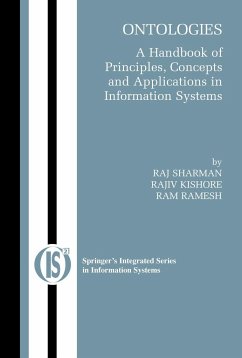
Challenges of Expanding Internet: E-Commerce, E-Business, and E-Government
5th Ifip Conference on E-Commerce, E-Business, and E-Government (I3e'2005), October 28-30 2005, Poznan, Poland
Herausgegeben: Funabashi, Matohisa; Grzech, Adam
Versandkostenfrei!
Versandfertig in 6-10 Tagen
113,99 €
inkl. MwSt.

PAYBACK Punkte
57 °P sammeln!
Within the last decade several new developments have contributed to many new opportunities, as well as to a need for intensive research and development. New applications are driven by the desire for ubiquitous high-quality access to offered and available services at reasonable cost.
A considerable amount of research and development activities are currently going on world wide in order to adopt Internet services to the particular needs of users working in various environments and having an access to a great amount of information provided by commerce, business and public institutions. Expanding understanding and usage of Internet raise different technological problems and societal impacts. The emergence of the new societal environment created by Internet is a historical necessity; digitization becomes a correlate of most human activities nowadays including e-economy, e-medicine, e-government, etc.
As a medium of communication the Internet reached a relative maturity, whilst as a new societal environment it is still in the making. The Internet produces an enormous and huge e-environment society requiring intermediaries who guide, search, integrate and authenticate knowledge and information.
The 5th IFIP I3E'2005 proceedings contains a selection of 40 research contributions, which were extended to incorporate the numerous suggestions made by the itnernational reviewers. The papers in this volume address problems located in three main categories: e-commerce, e-business and e-government. Some of them are interdisciplinary and address problems common to the other mentioned areas.
A considerable amount of research and development activities are currently going on world wide in order to adopt Internet services to the particular needs of users working in various environments and having an access to a great amount of information provided by commerce, business and public institutions. Expanding understanding and usage of Internet raise different technological problems and societal impacts. The emergence of the new societal environment created by Internet is a historical necessity; digitization becomes a correlate of most human activities nowadays including e-economy, e-medicine, e-government, etc.
As a medium of communication the Internet reached a relative maturity, whilst as a new societal environment it is still in the making. The Internet produces an enormous and huge e-environment society requiring intermediaries who guide, search, integrate and authenticate knowledge and information.
The 5th IFIP I3E'2005 proceedings contains a selection of 40 research contributions, which were extended to incorporate the numerous suggestions made by the itnernational reviewers. The papers in this volume address problems located in three main categories: e-commerce, e-business and e-government. Some of them are interdisciplinary and address problems common to the other mentioned areas.
2.1 E-Government: e-Governance and e-Democracy The term Electronic Government (e-Government), as an expression, was coined after the example of Electronic Commerce. In spite of being a relatively recent expression, e-Government designates a field of activity that has been with us for several decades and which has attained a high level of penetration in many countries2. What has been observed over the recent years is a shift on the broadness of the e-Government concept. The ideas inside e-Governance and e- Democracy are to some extent promising big changes in public administration. The demand now is not only simply delivering a service - line. It is to deliver complex and new services, which are all citizen-centric. Another important demand is related to the improvement of citizen's participation in governmental processes and decisions so that the governments' transparency and legitimacy are enforced. In order to fulfill these new demands, a lot of research has been done over the recent years (see Section 3) but many challenges are still to be faced, not only in the technological field, but also in the political and social aspects.














